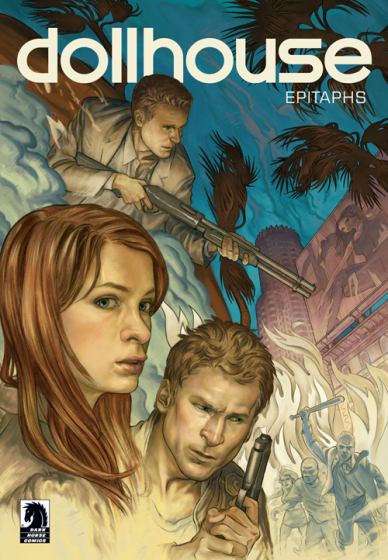
Tancharoen, Maurissa and Jed Whedon. “Dollhouse.” Dark Horse Comics, 2011. JPG Format, front cover.
“In every major city, Dollhouses provided wealthy clients with any kind of companionship they required. For a price, beautiful young men and women opted to have their minds wiped clean, turning themselves into ‘Dolls’ who could be imprinted with computer-enhanced personalities and skills—to fit any buyer’s request. Now the Dollhouse technology has gone viral…” (Tancharoen and Whedon 1).
Set in a futurist Los Angeles, Maurissa Tancharoen and Jed Whedon’s comic Dollhouse documents the technological takeover that wipes clean the minds of innocent civilians, turning them into mindless killers set to follow the orders of the program that now controls them. This post-human, technologically-advanced society, while clearly fictional and far-fetched, does provide its audience with realistic insight, showing how impactful technology can be on culture. In this paper, I will examine what Dollhouse predicts about the future as it provides awareness as to where society is headed. Focusing on the effects technology has on culture in particular, I will discuss how easily technology can take over society, how it can be taken too far, and how it challenges society’s morals, as seen through Dollhouse.
In order to fully understand an analysis of Dollhouse, I will begin by providing a little background history into the storyline. Rossum Corporation, a highly successful technology company, has developed a mind-altering invention that gives them the ability to download different personalities as software into individuals’ brains. In this way, clients are able to purchase companionship through these “dolls” who are fitted to their exact requests according to personality, qualities, and skills. Unfortunately, the Rossum Corporation’s morals have turned evil as they begin to use the mind-altering process to take over America, one region and initiative at a time.
In our current society, technology is a fundamental part of life. Not only does society enjoy technology for the ease it brings to life, but at this point, our lives essentially depend on it. We no longer view computers and telecommunication systems as ‘tools,’ as John Armitage and Joanne Roberts explain in their book Living with Cyberspace, “…Rather they are part of the context in which life is lived… In technologically advanced societies ‘technology’ is not a separate item or a separate moment; it is part of what constitutes our sociality” (Armitage and Roberts 32).
Advanced technologies have permeated every aspect of culture and in this way ideas are easily spread. In Dollhouse, society is operating under normal conditions until Rossum’s evil initiatives begin. Technology is so integrated into every living, breathing moment that simply by tapping into phone calls, Rossum is able to quickly turn almost all of society into mindless killers. The comic begins with the rapid spread of Rossum’s control and takeover as citizens receive a call, put their phone to their ear, and consequently have their minds erased which leads to their immediate aggression and killing of others around. As seen below in this excerpt from Dollhouse, it is not hard for Rossum to reach all of society given that everyone is always connected in some way to technology.
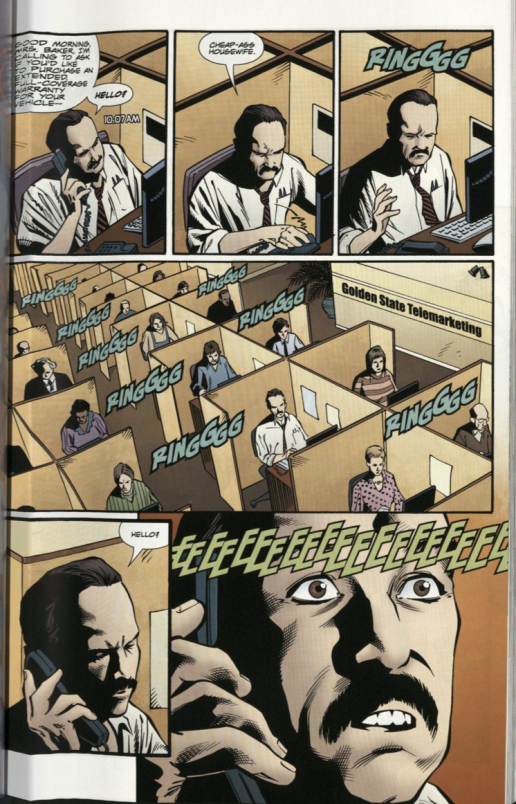
Tancharoen, Maurissa and Jed Whedon. “Dollhouse.” Dark Horse Comics, 2011. JPG Format scanned from Special Collections, page 32. Just by picking up the phone, multitudes of citizens are immediately brainwashed by Rossum’s evil technology, turning them into zombie-like creatures following the set of orders that now control their minds.
With this in mind, Dollhouse can be seen to predict that society’s dependence and constant connection to technology could lead to serious consequences. Much of our culture today, including communication and social relationships, has already been immensely influenced by our constant connection to social media and cell phones, but Dollhouse can be seen to predict that this downfall will be taken even further. This “evil” aspect of technology is brought up by Armitage and Roberts as they discuss the key contribution of current deliberations on cyber theory is “the discovery that to live with cyberspace is to live with technological risk in the context of the ‘social imaginary’ of contemporary everyday life” (Armitage and Roberts 1). With the integration of technology into every part of our lives, risk comes about because technology can easily be taken away, stop working, or be used for other unintended purposes. The “Doll” technology, which was just supposed to be used for pleasure, is altered in its means for evil purposes. This risk is perfectly exemplified in Dollhouse’s “thought-pocalypse” as civilization faces its downfall due to Rossum Corporation and the erasing of society’s minds and thoughts.
Another fear of technology demonstrated in Dollhouse is how technology can be taken too far and in these drastic measures, almost taken to the point of no return. The post-human society that has developed because of Rossum’s inventions gives people the ability to transfer and download any knowledge or skills into their brains. With the right software installed, young African American Trevor discovers the endless possibilities that come along with the technology, including the ability to understand Mandarin Chinese, fight muay-thai, and use deadly weapons to kill the zombie-like citizens. These superhero-like abilities come back to haunt Trevor, however, as he realizes that underneath the mindless-exterior, he really is still killing and partaking in the deaths of many citizens.
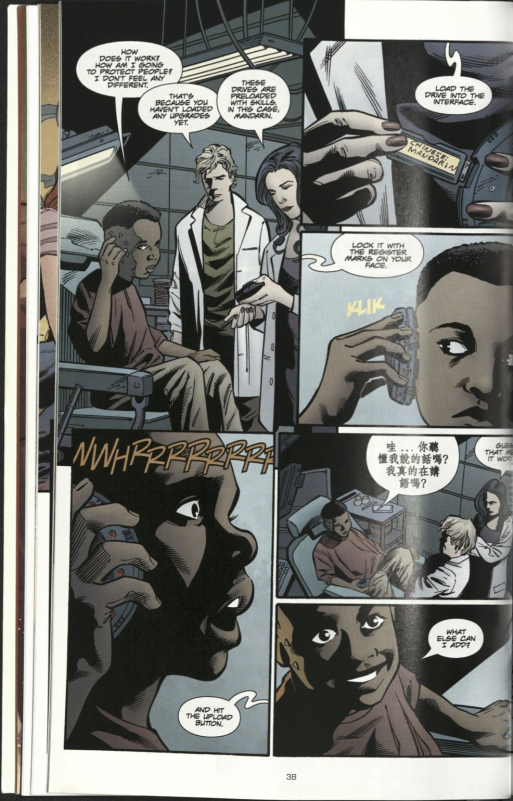
Tancharoen, Maurissa and Jed Whedon. “Dollhouse.” Dark Horse Comics, 2011. JPG Format scanned from Special Collections, page 38. With the simple addition of the “Doll” hardware into his head, Trevor now has the ability to download his choice of any knowledge and skills, including the ability to understand Chinese Mandarin as pictured above.
After witnessing his uncle’s death, Trevor and the rest of the main characters attempting to stop the spread of this evil technology exclaim, “We are the monsters…” (Tancharoen and Whedon 27). This reflection highlights the idea that society can become so wrapped up in technology that we don’t even stop to consider the effects of our actions. Our morals can be pushed to the side or forgotten about when faced with so many inventions that distract us from real life. In his paper, “Technology and Fear,” Emilio Mordini explains how advanced thought and focus on modernizing technology affects our culture when he writes, “Modernity is confronted with revolutionary and accelerated changes in science and technology that challenge basic implicit and explicit moral assumptions and legal norms…Naturally, nothing is perfectly safe, and risks are hidden and unpredictable. When electric light bulbs were introduced, the New York Times issued warnings that they might cause blindness. This turned out to be wrong, yet today the generation of electric power produces more pollution than any other single industry in the world” (Mordini 546). This quote emphasizes the idea that society can often forget about the big picture and greater good when faced with so many technological advancements. Even though these time-saving inventions produce more efficient and productive outcomes, if they are still morally wrong, against our values, or producing an unintended consequence, we must rethink our actions.
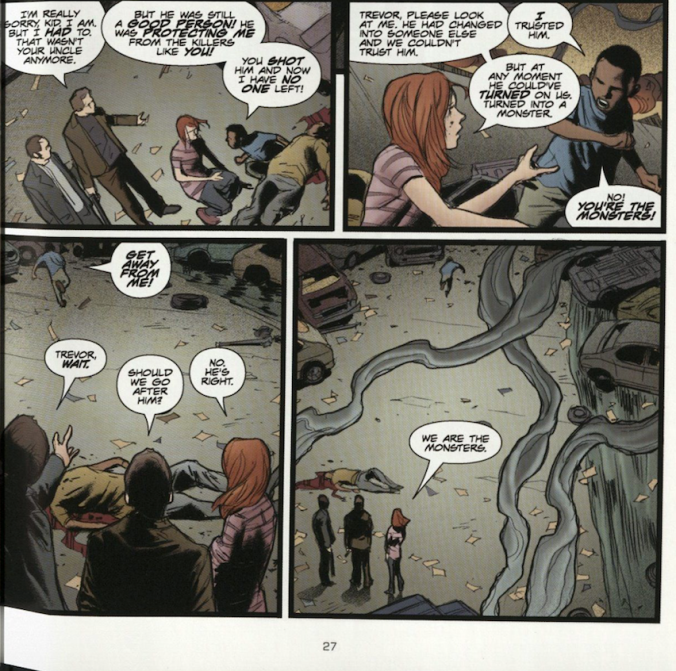
Tancharoen, Maurissa and Jed Whedon. “Dollhouse.” Dark Horse Comics, 2011. Screenshot from JPG Formatted image scanned from Special Collections, page 27. After the death of his Uncle, Trevor and the other characters in the comic set out to save the world reflect on their actions, realizing that even though they think they are killing the monsters, they are the monsters themselves by their actions.
Dollhouse is therefore predicting that society’s cultural values will be pushed to the side as our focus on technology intensifies. Trevor sadly remarks, “Ivy said I had to take things out of my head to make room for upgrades…How do I get rid of how I feel right now?” (Tancharoen and Whedon 51). While technology can solve almost all of our problems, it cannot solve how we feel or fix our emotions. This idea strongly shows how our dependence on technology can be unhealthy. Dollhouse is showing us that society must stay true to its most human values and morals. As technology can give rise to division among the powerful and the powerless, one must not forget that at the end of the day we are all humans. When discussing this social division as a result of technology, Armitage and Joanne write, “…and I can only teleconference because I am a relatively privileged member of the academic world, again, with a high degree of connectivity. In today’s world the rising speed of communication disconnects certain groups as fast as it connects others. It produces polarization, not a homogeneous global village” (Armitage and Roberts 25). In Dollhouse, Rossum Corporation becomes the powerful elite as it controls society with its stronghold on technology, while the rest of the population becomes the powerless. In this same way, individuals who have access to technology through wealth become even more powerful as others who are not as fortunate to afford such technology are left at a disadvantage. Inequality emerges through this focus on technology in society’s culture and is another problem that Dollhouse predicts will intensify over time.
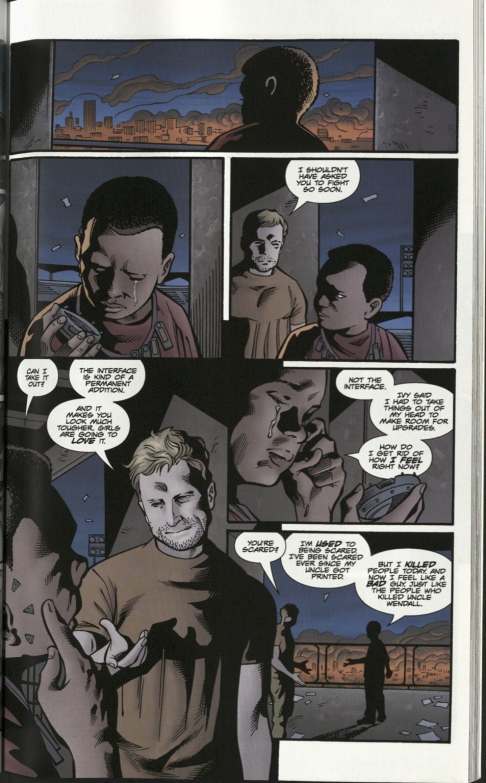
Tancharoen, Maurissa and Jed Whedon. “Dollhouse.” Dark Horse Comics, 2011. JPG Format scanned from Special Collections, page 51. While the “Doll” technology provides Trevor with so much excitement and endless possibility as to what skills he can perform, he realizes the negative toll his actions take on his morality and emotions.
One final important idea that Dollhouse presents to society is the concept that once the citizens have been imprinted by Rossum’s technology, they are essentially dead. When comforting Trevor about his regret in killing the mindless citizens, protagonist Ivy says, “The butchers we killed…Rossum erased their minds. Neurologically speaking, they were already dead” (Tancharoen and Whedon 52). This concept of already being dead due to technology can relate to our current society in how we are so connected to our cellphones and social media that we can often become emotionless when it comes to face-to-face interaction. Dollhouse predicts that society’s relationship with personal technology will grow so strong that any social relationship can be considered ‘dead’ in comparison. With the takeover of technology, our minds are already so encompassed with advancements and software that any social interaction seems meaningless.

Tancharoen, Maurissa and Jed Whedon. “Dollhouse.” Dark Horse Comics, 2011. JPG Format scanned from Special Collections, page 52. The rush of technology catches up to Trevor as he reflects on his previous actions, while Ivy insists the mindless citizens could be considered “already dead.”
The comic Dollhouse presents many societal issues about technology’s impact on culture which can be directly related to problems our current society faces. When analyzed, the comic can be seen to predict where society is headed in regards to how easily technology can take over, how it can be taken too far, and how it affects our cultural values and morals. In Dollhouse, the heroes attempting to save the world have one goal they need to accomplish in order to stop all the destruction: kill the technology. Since Rossum Corporation’s evil motives are at the foundation of all the trouble, once the company is stopped and the evil technology is destroyed, all of society’s problems will seem to have cleared up. But while this solution may be easy to spot for the individuals in Dollhouse, a solution to fix our current society’s problems with technology will not be as easy to discover. At the end of the day, technology is an essential part of our everyday existence. However, society cannot put technology first in regards to culture or basic human rights. It is critical that society examines its relationship and dependence on technology in order to avoid further problems or, like predicted in Dollhouse, society’s downfall.
Works Cited
Armitage, John and Joanne Roberts. Living with Cyberspace: Technology and Society in the 21st Century. Bloomsbury Publishing PLC, 2003. ProQuest Ebook Central.
Mordini, Emilio. “Technology and Fear: Is Wonder the Key?” Trends in Biotechnology, vol. 25, no. 12, Dec. 2007, pp. 544–546. Science Direct.
Tancharoen, Maurissa and Jed Whedon. “Dollhouse.” Dark Horse Comics, 2011.
Advertisements Share this:




